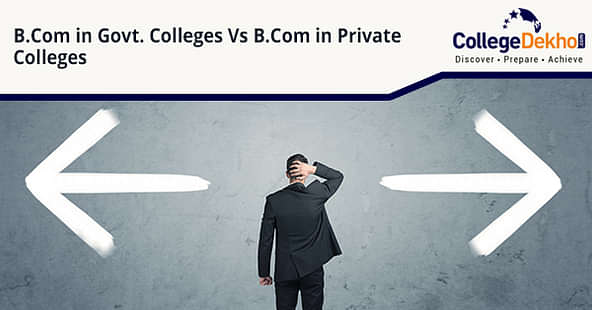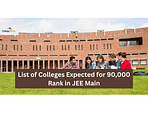Struggling to choose between a government or a private college for a B.Com degree? Our detailed analysis covers everything from curriculum to fees and scholarships, helping you make an informed decision for your future. Do not miss out on this essential article.
- B.Com in Government Colleges
- B.Com in Private Colleges
- Difference Between B.Com in Government College vs Private College
- B.Com in Government Colleges: Advantages and Disadvantages
- B.Com in Private Colleges: Advantages and Disadvantages
- Top Government B.Com Colleges in India 2024
- Top Private B.Com Colleges in India 2024
- Best Career Options after B.Com
- More Related Articles
- Faqs

Securing higher education is vital for realizing career goals, and the selection of an appropriate college holds substantial importance. For those embarking on a Bachelor of Commerce (B.Com) journey, the decision between Government Colleges and Private Colleges poses a challenge. Each option comes with its own set of advantages and disadvantages, complicating the process of determining the most suitable choice for individual requirements. This article aims to offer a thorough comparison of B.Com programs from government and private colleges, encompassing elements like course content, faculty, facilities, costs, financial aid, and employment prospects.
While both government and private institutions confer Commerce degrees, notable distinctions exist, necessitating careful consideration by students prior to reaching a decision. This article will explore the merits and drawbacks of pursuing a B.Com degree in government colleges versus private colleges, aiding students in making well-informed choices. Additionally, to support students in aligning their decisions with their objectives and aspirations, we will address a few commonly asked questions after this article.
Best Career Options after B.Com - Check Scope, Job Profile, Salary |
|---|
B.Com in Government Colleges
While the curriculum remains consistent across government colleges, a potential drawback is the limited variety in course offerings. Admissions can be highly competitive due to the limited seats, but the benefits, including accessibility, high-quality instruction, and hands-on learning opportunities, make government institutions a sensible option for B.Com aspirants.
Notable government colleges for B.Com in India include St. Xavier's College in Mumbai, Lady Shri Ram College for Women in Delhi, and Loyola College in Chennai, among others. Overall, these institutions offer quality education, practical exposure, and access to scholarships, making them an excellent choice for those pursuing commerce and accounting careers.
Also Read: B.Sc vs B.Com vs BA: Which is Better?
B.Com in Private Colleges
A B.Com degree from a private college provides students with numerous advantages. Private institutions offer a diverse range of B.Com programs, including regular and professional tracks, as well as integrated B.Com-MBA programs. Smaller class sizes, varied elective subjects, and innovative teaching methods contribute to a well-rounded education, giving students a competitive edge in the job market.
Private colleges often collaborate with top businesses, offering students internship and job placement opportunities. This exposure allows students to stay updated on the latest industry methods and trends.
It's essential to note that private colleges generally have higher fees compared to government counterparts. Additionally, the quality and reputation of private colleges vary, necessitating thorough research before enrolling in a B.Com program at a private institution.
Difference Between B.Com in Government College vs Private College
When it comes to pursuing a Bachelor of Commerce (B.Com) degree, one of the biggest decisions to make is whether to opt for a government or private college. Each type of institution has its own unique set of advantages and disadvantages, from fees and infrastructure to faculty and curriculum. In this section, we will explore the comparison of government and private colleges for B.Com, providing insight into the key factors to consider when making this important decision.Category | BCom Government Colleges | BCom Private Colleges |
|---|---|---|
Ownership |
|
|
Funds |
|
|
Fee Structure |
|
|
Infrastructure |
|
|
Type of Faculty |
|
|
Teaching Quality |
|
|
Size of Classroom |
|
|
Placement |
|
|
Curriculum | Government colleges typically follow a more traditional and rigid curriculum that is standardized across all institutions. | Private colleges have the freedom to design their own curriculum and can often tailor it to meet the specific needs of their students. Private colleges may offer additional courses, seminars, and workshops that can help students gain a competitive edge in the job market. |
Reputation | Government colleges have a long-standing reputation and are generally viewed as more prestigious than private colleges. | In recent years, a lot of excellent private colleges are gaining popularity and traction due to good education and other facilities. |
Campus Life | The campus life in government colleges may be more diverse but the range of extracurricular activities could be limited. | Private colleges, however, may offer a more focused and structured campus life, with more emphasis on academic and career development. This may also translate into better resources and facilities for students in private colleges. |
Admission Process | The admission process for most of the reputed colleges/ universities requires candidates to go through an entrance exam. | Private colleges, on the other hand, offer admissions based on both merit and entrance exams. Admission to a private college is easier compared to government colleges. |
Scholarships | Scholarship opportunities are typically more prevalent in government colleges compared to private colleges. This is because government colleges have access to various state and central government scholarships, making education more accessible to students from lower-income families. | Private colleges may offer scholarships, but they tend to be limited and highly competitive. |
In conclusion, choosing between a government or private college for pursuing a B.Com degree can be a difficult decision. Both options have their advantages and disadvantages. Ultimately, the decision should be based on individual preferences and priorities. Students should weigh the pros and cons of each option carefully and choose the one that best suits their academic and career goals.
B.Com in Government Colleges: Advantages and Disadvantages
Advantages:
1. Recognition and Reputation: Government colleges enjoy recognition and respect from both employers and academic institutions, enhancing the value and credibility of a degree in the job market.
2. Affordable Fees: Government colleges feature a low fee structure as they are heavily subsidized by the government, ensuring affordable education for all.
3. Quality Education: Renowned for their quality education and experienced faculty, government colleges implement strict admission processes and maintain well-structured course curricula.
4. Infrastructure and Facilities: Equipped with modern infrastructure, government colleges provide facilities like libraries, computer labs, sports amenities, fostering an environment conducive to academic excellence.
Disadvantages:
1. Limited Seats: Government colleges have a restricted number of seats, intensifying competition for admission.
2. Lack of Modern Infrastructure: Some government colleges may lack modern infrastructure, potentially impacting students' learning experiences.
3. Bureaucratic Procedures: Bureaucratic procedures in government colleges can lead to delays in admission, examination results, and other administrative tasks.
4. Limited Exposure: Government colleges might offer less exposure to industry and practical experiences compared to what private colleges provide.
5. Outdated Curriculum: Certain government colleges may use outdated curriculum and teaching methods, affecting students' employability in a rapidly changing job market.
6. Slow Academic Progress: Due to a large student population and limited resources, academic progress in government colleges can be slow, resulting in extended course durations and delayed graduation.
7. Inadequate Faculty: In some instances, government colleges may face a shortage of qualified and experienced faculty members, potentially affecting the quality of education provided to students.
B.Com in Private Colleges: Advantages and Disadvantages
Advantages:
1. Flexible Course Curriculum: Private colleges offer a more adaptable course curriculum tailored to industry needs, often collaborating with experts and providing practical training and internships for hands-on experience.
2. Modern Infrastructure: Private colleges heavily invest in state-of-the-art infrastructure, including classrooms, libraries, and labs equipped with the latest technology.
3. Greater Autonomy: Private colleges possess more autonomy in decision-making, enabling them to adapt to market trends and offer innovative programs.
4. Placements: Establishing tie-ups with reputable companies, private colleges frequently provide excellent placement opportunities for their students.
Disadvantages:
1. High Tuition Fees: Private colleges are generally more expensive than government counterparts, potentially requiring students to take out more loans or work part-time jobs to afford tuition and other fees.
2. Lack of Government Funding: Private colleges lack government funding, potentially resulting in fewer resources compared to government institutions. This may limit access to certain facilities, programs, or opportunities available to government college students.
3. Quality of Faculty: While some private colleges boast highly qualified faculty, others may not match the level of expertise or experience found in government colleges, impacting the quality of education.
4. Limited Scholarship Opportunities: Private colleges may not offer as many scholarship opportunities as government counterparts, posing challenges for students from low-income families in affording college.
5. Emphasis on Profit: Operated as businesses, private colleges prioritize profit, potentially leading to a focus on attracting more students and generating revenue rather than emphasizing high-quality education.
Top Government B.Com Colleges in India 2024
Below you can see the list of top government B.Com Colleges in India along with their fee structure and location.
Name of the College | State | Location | Approximate Fees per year |
|---|---|---|---|
Bihar | Patna | Rs 6,275/- | |
Bihar | Patna | - | |
Chandigarh | Chandigarh | Rs 7,600/- | |
West Bengal | Kolkata | Rs 1,675/- | |
| Tamil Nadu | Chennai | - | |
Haryana | Gurgaon | Rs 8,144/- | |
Haryana | Yamunanagar | Rs 18,510/- | |
Rajasthan | Kota | Rs 4,400/- | |
Delhi | Delhi | 13,505/- | |
Delhi | Delhi | Rs 7,450/- | |
| Delhi | Delhi | Rs 17,240/- | |
| Delhi | New Delhi | Rs 21,290/- | |
| Delhi | New Delhi | Rs 12,495/- | |
| Delhi | New Delhi | Rs 15,810/- | |
| Delhi | New Delhi | Rs 12,405/- |
Top Private B.Com Colleges in India 2024
Below you can see the list of top private B.Com Colleges in India along with their fee structure and location:
Colleges Name | Sate | Location | Annual Fee (Approximate) |
|---|---|---|---|
| Amity University | Chhattisgarh | Raipur | Rs. 1,00,000/- |
| Gujarat | Surat | Rs. 40,000/- | |
Lal Bahadur Shastri Institute of Technology & Management (LBSITM) | Madhya Pradesh | Indore | Rs.25,000/- |
Rajasthan | Jaipur | Rs 20,000/- | |
Madhya Pradesh | Gwalior | Rs 96,000/- | |
Uttar Pradesh | Ghaziabad | Rs 25,000/- | |
Uttar Pradesh | Mathura | Rs 45,000/- | |
Rajasthan | Neemrana | Rs 64,000/- | |
Karnataka | Bangalore | Rs 60,000/- | |
Uttar Pradesh | Ghaziabad | Rs 25,000/- | |
Rajasthan | Jaipur | Rs 25,000/- | |
Rajasthan | Dausa | Rs 20,000/- | |
Punjab | Ludhiana | Rs 45,500/- | |
Maharashtra | Pune | Rs 26,613/- | |
Kerala | Ernakulam | Rs 22,500/- | |
Maharashtra | Mumbai | Rs 19,087/- | |
Maharashtra | Mumbai | Rs 4,194/- | |
Karnataka | Bangalore | Rs 60,000/- |
Also Read: B.Com (Hons) vs Economics (Hons): Which is the Better Course?
Best Career Options after B.Com
There are many career options available for B.Com graduates. Some of the well-known career Option are listed below:-
CA is one of the most successful occupations for business students. The Institute of Chartered Accountants (ICAI) conducts CA exams and needs one to clear three assessments viz. CPT, IPCC, and CA Finals. CA graduates 'average salary in India is Rs. 7.9 LPA.
Business Accounting and Taxation (BAT)
BAT is a popular course among B.Com graduates. After completing this course, candidates can start working as a financial consultant, business lawyer, or corporate law assistant.
The course takes just 9 months to complete after graduation, and the exams of this course are conducted in May and November in two sections. The pay is relatively high, ranging from 10 to 18 Lakhs a year after completion of this course.
Digital Marketer
Digital marketing is your turning point if you're looking for a creative job. Through this course, you will learn what the modern business world is like and how. Courses in digital marketing will last between three and eight months. This work is employed by several multinational and indigenous corporations. The average package of Digital marketers lies in between 5 Lakhs a year.
While there are a host of various career paths that can be chosen after graduating from a B.Com degree in India, many students opt for pursuing higher education, sometimes in different disciplines altogether. Among the different higher education degrees available to a student include:
More Related Articles
You may click on the link given below to learn more:
Stay tuned with CollegeDekho for more such content.

















Similar Articles
Government Jobs for Commerce Students with High Salary
Best Courses after 12th for Commerce Students
CUET 2024 Teaching Aptitude Syllabus (Released): Check Topics, Pattern, Download PDF
CUET Accountancy Syllabus 2024 (Released): Check Topics, Pattern, Download PDF
List of Top Government Jobs after B.Com: Explore Your Options
B.Com (Hons) vs Economics (Hons): Which is the Better Course?